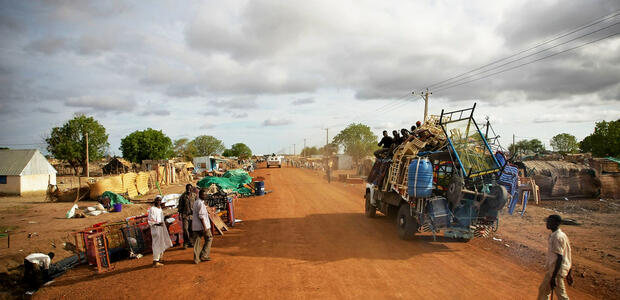Working Paper
Contract farming in Mozambique
This paper analyses the implication of contract farming on gender inequalities in rural Mozambique. Contract farming is often considered one of the major tools of agribusiness development: it broadly includes those arrangements under which producers...
Blog
A fiercely contested omission — or why we need to keep talking about unpaid care

by
Naila Kabeer
March 2022
In the late 1950s, the United Nations System of National Accounts was set up to promote the collection of internationally comparable data on...
Blog
Persistent gender roles in South Africa deprive women of leisure time

by
Priyanka Harrichurran
March 2021
In most countries, traditional gender roles within the household are still common due to the prevalence and persistence of patriarchal systems. These...
Working Paper
Material barriers, cultural boundaries
Data on female labour force participation in Bangladesh suggest that, despite the increase in female-intensive employment opportunities through microfinance, export garment manufacturing, and community-based services, the majority of working women...
Working Paper
What explains the gender gap in top incomes in developing countries?
Based on tax records data from Ecuador, we analyse gender differences in top income groups from 2008 to 2017. Ecuador represents an interesting case as it shares many trends with other countries in the region in terms of women’s status in the labour...
Working Paper
Impact of female peer composition on gender norm perceptions and skills formation in secondary school
This paper examines peer effects on students’ gender norm perceptions and skills formation. I use a Uruguayan nationally representative survey of 9th grade students and exploit the quasi-random variation in the proportion of female peers across...
Blog
A summer reading list of our latest papers, articles, and books
At the UNU-WIDER offices here in Helsinki, Finland, the summer holidays are almost upon us. Looking at the list of new UNU-WIDER publications, it is...
Working Paper
Segregation of women into low-paying occupations in the United States
We extend the conventional framework for measuring segregation to consider stratification of occupations by gender, i.e. when women or men are predominantly segregated into low-paying jobs. For this, we propose to use concentration curves and indices...
Working Paper
Gender inequalities among adults and children in collective households
This paper studies the distribution of resources within Albanian families in 2012 using a collective consumption model with two alternative specifications: the first enables the estimation of intrahousehold distribution of resources among male adults...
Journal Article
Segregation of women into low-paying occupations in the United States
We extend the conventional framework for measuring segregation to consider the stratification of occupations by gender, i.e. when either women or men are predominantly segregated into low-paying jobs. We propose the use of the concentration curve to...
Policy Brief
Unequal growth in Mozambique and the region
There is an increasing interest in the analysis of economic inequalities in least developed countries. This is not only the result of a general social preference for equality, but also the consequence of a growing sense that highly unequal societies...
Blog
Moving out of identity silos and into intersectionality: The example of gender identity

by
Smriti Sharma
May 2019
Women are undoubtedly doing better today than they were even 40-50 years ago. The gender gap has shrunk in many areas, including educational...
Seminar
Mehwish Ghulam Ali on do son preferences cause a gap between desired and actual fertility in Pakistan?
Mehwish Ghulam Ali will present at the WIDER Seminar Series on 6 November 2019. Abstract - Do son preferences cause a gap between desired and actual fertility in Pakistan? Parental preference for sons is a major characteristic of many societies...
6 November 2019
UNU-WIDER,
Katajanokanlaituri 6 B,
Helsinki,
Finland
Past event
Working Paper
The influence of household composition on leisure time in South Africa
This study considers how household composition influences the leisure time of men and women in South Africa, using the South African 2010 Time Use Survey. Studying leisure time is important since the allocation of time outside the market provides...
Blog
The labour market implications of COVID-19 for Bangladeshi women
by
Sayema Haque Bidisha, Avinno Faruk
July 2020
With the first confirmed case of COVID-19 in Bangladesh on 8 March 2020 and the initiation of a lockdown on 26 March 2020,1 the livelihoods of a...
Policy workshop
Labour market inequality and intergenerational mobility
UNU-WIDER hosts an inception workshop on labour market inequality and intergenerational mobility part of the new inequality theme as part of our current 2024–27 work programme. On 16 April 2024, we host a collaborative brainstorming session that...
16 April 2024
Hybrid,
Katajanokanlaituri 6 B,
Helsinki,
Finland
Past event

 Join the network
Join the network









